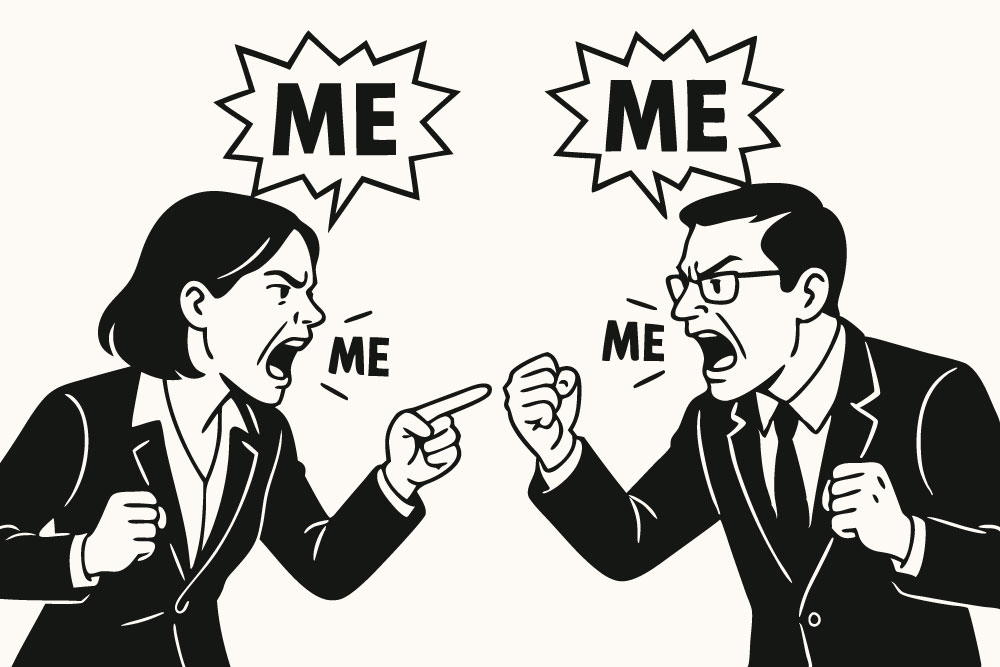What makes people mean?
ten factors that reduce our empathy for others
∼ a little insight into our own psychology

by Katy Elphinstone, July 2025
-
Here are ten factors that, according to research studies (refs at the end), work towards decreasing our empathy towards others:
- If we're in a hurry.
- If we're overwhelmed with too many tasks or a large workload.
- If we experienced high levels of intolerance for certain behaviours or traits in our childhood.
- If we have strong fixed beliefs about what is 'right' and wrong', e.g. in the context of morality and religion.
- If we regularly possess relative and/or systemic power.
- If we're competitive and hard on ourselves, and our more confident behavior may hide low self-esteem.
- If we were raised without empathy and therefore lack self-compassion.
- If someone we may have felt empathy for, happens to be higher up in the social hierarchy than us.
- If we're afraid of being vulnerable due to conditioned distrust of others.
- If others provide services or resources that we rely on. In these cases, we're likely to prioritize our own agenda over any empathy we might have had for them.
It's worth noting that we rarely admit, not even to ourselves, when we're motivated more by our agenda for someone than by their wellbeing. We're much more likely to tell ourselves – and others – that whatever our agenda happens to be is 'for their own good', or else that they owe it to us, or that they don't really have feelings, or some other story that makes us look a bit kinder.
Finally, our empathy levels quickly get lower if we’re surrounded every day by people who have little to no empathy for others. The opposite is also true, which is that if others around us show consistent and disinterested empathy and compassion, it's harder to remain unempathetic ourselves.
❤️
Refs:
1. The 'Samaritan who wasn't in a hurry' experiment: From Jerusalem to Jericho: A study of situational and dispositional variables in helping behavior, Darley, J. M., & Batson, C. D. (1973). Journal of Personality and Social Psychology, 27(1), 100–108.
2. Too busy for empathy, Sidhu, R. (2018). ChangeQuest.
3. The connection between fear and hate, Cohen, I.S. (2024). Psychology Today.
4. Exploring the Relationship Between Self-Compassion and Compassion for Others: The Role of Psychological Distress and Wellbeing, García-Campayo J, Barceló-Soler A, Martínez-Rubio D, Navarrete J, Pérez-Aranda A, Feliu-Soler A, Luciano JV, Baer R, Kuyken W, Montero-Marin J. (2024), Jul 31(5), 1038-1051.
5. Empathy tends to flow down social power gradients. (Vorauer and Quesnel 2016; Vorauer et al. 2016). From Leake, E. (2019). Empathy as Research Methodology. In: Liamputtong, P. (eds) Handbook of Research Methods in Health Social Sciences. Springer, Singapore.
6. A lack of exposure to different cultures, beliefs, and ways of life causes intolerance: Understanding the Roots of Intolerance: The psychology of hate, Jane, E., Serlachius, A., Cavadino, A., Kirby, J.N. and Consedine, N.S. (2023).
7. No more space to care, Cleveland Clinic.
8. Empathy Fatigue: How Stress and Trauma Can Take a Toll on You
9. Not helping people we’ve made moral judgements about: Moral judgment modulates neural responses to the perception of other’s pain: an ERP study Cui, F., Ma, N. and Luo, Y. (2016). Nature Magazine.
10. Power blocks empathy, Segal, E.A. (2019). Psychology Today.
11. Being raised without empathy: Empathy Deficit Disorder: What Causes Lack of Empathy in Children? Turner, J. (2023). Aspire Atlas.
12. Depressive symptoms in parents are associated with reduced empathy toward their young children: Depression reduces empathy, Salo, V.C., Schunck, S.J. and Humphreys, K.L. (2020).
13. Reasons: Why narcissists struggle with intimacy, Reasons (2024). Our Mental Health.
Images reprinted in this article with permission as follows:
1. Vector image by Adobe Stock Photos
2. Person and dog relaxing on couch, by Arlisa
